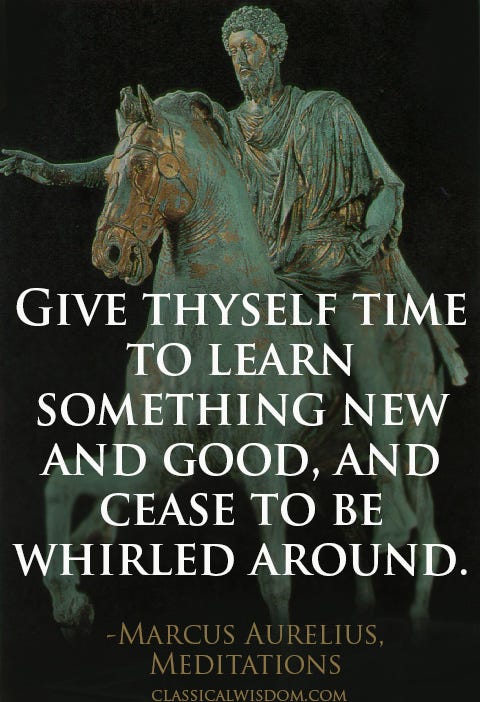Dear Classical Wisdom Member,
For those of you who are truly dedicated to the great Roman Emperor, Marcus Aurelius, you no doubt have already donned your party hat, blown up the balloons, and found some simple fruits to stick a candle in.
After all, today is the anniversary of his birth.
We are here at Classical Wisdom are celebrating with an in-depth article about the Life of Marcus Aurelius (below), as well as a double event day:
One that looks objectively at Stoicism (a practice a true philosopher like Marcus would have no doubt approved of) and…
It’s going to be crazy!
In addition, we are releasing for our members Marcus Aurelius’ Meditations, complete with introductions, commentary and foreword by Classical Wisdom, which members can access here:
Included is today’s article which outlines the life and times of the man himself… so start reading below and then enjoy the rest in the Ebook above.
All the best,
Anya Leonard
Founder and Director
Classical Wisdom and Classical Wisdom Kids
The Life of Marcus Aurelius
Written by Katherine Smyth Contributing Writer, Classical Wisdom
A Man of Many Names
Marcus was born on the 26th of April, in Rome, in the year 121 A.D.. He bore many different versions of his name whilst growing up; these changed as his familial status was altered first by the death of his father, then his unofficial adoption by his grandfather, and finally his legal coming of age. Some of the names he was known by include Marcus Annis Verus, Marcus Annis Catilius Severus, or Marcus Catilius Severus Annius Verus.
But, when Antoninus Pius formally adopted him, as Hadrian’s successor, Marcus became heir to the empire, and his name was changed to Marcus Aelius Aurelius Verus Caesar. This name would only change once more; when he became emperor. His final, and full name—Marcus Aurelius Antoninus Augustus—would last until his death.
Roman: Flesh and Blood
Marcus’ family background was as noble as they came. He was of Italo-Hispanic descent on his father’s side and, as such, was a member of the Aurelii, who were based in Roman Spain. The Annia gens is also of Italian descent, with the Annii Veri having risen through the Roman ranks from the 1st century AD. Marcus was related directly to Marcus Annius Verus (I), his great-grandfather, an ex-praetor, and Marcus Annius Verus (II), his grandfather and unofficial adoptive father, who was a patrician.
However, Marcus was also a member of the Nerva-Antonine dynasty courtesy of his grandmother, Rupilia. As such, Marcus was also connected directly to Emperors Trajan and Hadrian through Hadrian’s wife Sabina. She was his grandmother’s half sister, with Sabina and Rupilia being daughters of Trajan’s sororal niece, Salonia Matidia.
Marcus’ mother, Domitia Lucilla, was notable historically, as she was immensely wealthy due to her inherited fortune. As the daughter of a Roman patrician, P. Calvisius Tullus, her wealth was so great that it included brickworks on the outskirts of Rome – which was a boon in an age of rapid expansion – and Horti Domitia Calvillae/Lucillae, the villa on the Caelian hill of Rome, one of the famous Seven Hills of Rome. Marcus would later refer to this villa as ‘My Caelian’, as he was born and raised there, and always remembered it fondly.
Finally, Marcus adopted the gen. name Aurelia when he was chosen as an heir to Antoninus Pius; not just the Emperor, but his adoptive father, and part of the Aurelii Fulvi, who stemmed from the Sabine and were of Italo-Gallic origin. But genes and family names do not an Emperor make. Though Marcus Aurelius was born into noble families, it was his education that would shape the born-leader’s mind and harness his abilities.
Educating an Emperor
Marcus’ formal education was instilled through several private tutors as befits his aristocratic standing; his adoptive father, Marcus Annius Verus (II), through patria potestas authority when Marcus Annius Verus (III) died around 124, oversaw his grandson’s upbringing. Marcus’ education taught him to be of good character and to avoid bad temper, something he recognized as being of great value, and he thanked his grandfather for his wisdom.
“From my grandfather Verus I learned to relish the beauty of manners, and to restrain all anger.” Meditations, I.1
Diogenetus, a painting master, also had great impact on Marcus; as it appears it is he who introduced the young man to philosophy and a philosophic way of life. This extended to Marcus taking up the robes and habits of a philosopher in the year 132. This involved wearing a rough Greek cloak whilst studying, and he would sleep on the ground for a period, although the latter part he would give away after a time, due to the many frequent and vocal concerns of his mother.
Amongst his other tutors were the Homeric teachers Alexander of Cotiaeum, Trosius Aper, and Tuticius Proculus, all who taught him Latin, with Marcus thanking Alexander for teaching him literary styling, which can be seen in Marcus’ Meditations. From AD 136, Marcus had three Greek tutors, Aninus Macer, Caninius Celer, and Herodes Atticus, along with Marcus Cornelius Fronto for Latin.
Late in 136 Marcus’ life changed dramatically; he took the toga virilis and began his training in oratory. After nearly dying, Emperor Hadrian, whilst convalescent in Tivoli, chose Marcus’ intended father-in-law, Lucius Ceionius Commodus, as his successor. Lucius took the name Lucius Aelius Caesar, making Marcus as Lucius’ adoptive son, a direct successor to the throne.
Keep reading with a 7-day free trial
Subscribe to Classical Wisdom to keep reading this post and get 7 days of free access to the full post archives.





![[Ebook] The Meditations of Marcus Aurelius](https://substackcdn.com/image/fetch/w_1300,h_650,c_fill,f_auto,q_auto:good,fl_progressive:steep,g_auto/https%3A%2F%2Fsubstack-post-media.s3.amazonaws.com%2Fpublic%2Fimages%2F6d5799c6-76b0-4c9b-832a-0d52e9cbab82_500x787.png)
